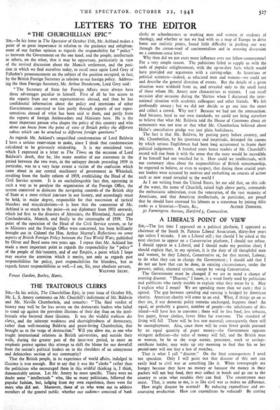LETTERS TO THE EDITOR 6, THE CHURCHILLIAN EPIC "
Sul,—In his letter in The Spectator of October 15th, Mr. Ackland makes a point of so great importance in relation to the guidance and enlighten- ment of our further opinion as regards the responsibility for " policy " as between the Government on the one hand, and the people, intellectuals or others, on the other, that it may be opportune, particularly in view of the revived discussion about the Munich settlement, and the posi- tion in which we find ourselves today, to recall once again Lord Grey of Falloden's pronouncement on the subject of the position occupied, in fact, by the British Foreign Secretary in relation to our foreign policy. Address- ing the then Foreign Secretary, Mr. Arthur Henderson, Lord Grey said: " The Secretary of State for Foreign Affairs must always have three advantages peculiar to himself. First of all he has access to the reports from our own representatives abroad, and then he has confidential information about the policy and intentions of other Governments conveyed to him partly through reports of our repre- sentatives abroad of what has been said to them, and partly from the reports of foreign Ambassadors and Ministers here. He is the most important person who shapes the policy of this country and who alone can know from the point of view of British policy the different values which can be attached to different. foreign questions."
As regards Mr. Ackland's unqualified condemnation of Lord Baldwin I have a serious reservation to make, since I think that condemnation
calculated to be grievously misleading. It is my considered view, which I expressed in a letter to The Times on the occasion of Lord Baldwin's death, that he, like many another of our statesmen in the period between the two wars, in the unhappy decade preceding 1939 in particular, was to a very large extent a victim of the confusion which came about in our central machinery of government in Whitehall, resulting from the faulty reform of 1919, establishing the Head of the Civil Service system. It is an unchallengeable fact that, operating in such a way as to paralyse the organisation of the Foreign Office, the system contrived to dislocate the navigating controls- of -the British ship of State at a most critical juncture in our history, and accordingly must be held, in major degree, responsible for that succession of tactical blunders and miscalculations—it is here that the contention of Mr. Ackland is so much to the point—in our diplomacy from 1931 onwards, which led first to the disasters of Abyssinia, the Rhineland, Austria and Czechoslovakia, Munich, and finally to the catastrophe of 1939. The point of the operation of the Head of the Civil Service system, so far as Ministers and the Foreign Office were concerned, has been brilliantly brought out in Colonel the Hon. Arthur Murray's Reflections on some aspects of British Foreign Policy between the Two World Wars, published by Oliver and Boyd some two years ago. I repeat that Mr. Ackland has made a most important point as regards the responsibility for " policy " of the people of this 'country, and of our Empire, a point which I hope may receive the attention which it merits, not only as regards past responsibilities for policy, past responsibilities for blunders, but as regards future responsibilities as well.—I am, Sir, your obedient servant,
Forest Garden, Burley, Hants. WALFORD SELBY.


































 Previous page
Previous page